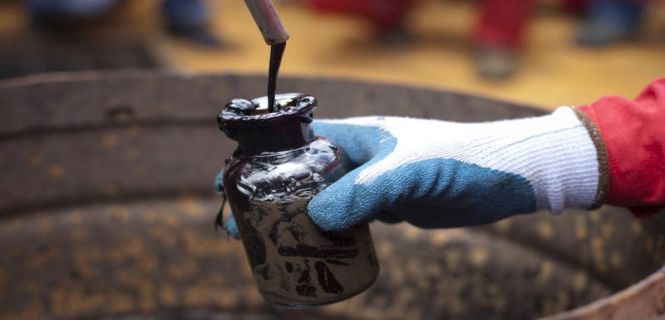
A worker Collects Crude Oil at an oil well operated by Venezuela's State Oil Company PDVSA
The last time that the world’s oil ministers met—in June in Vienna, Austria—oil hovered around $65 per barrel, a recovery from the steep drop earlier in the year. The meeting concluded with optimism that the plunge in oil prices had largely abated. As the Organization of the Petroleum Exporting Countries (OPEC) meets again—with its oil basket price now just below $40 per barrel—delegates will have to grapple with how wrong they were.
There are two theories about how OPEC will handle the bad news. The first centers on the fact that, after a year of low oil prices, the Saudis are facing open revolt from other OPEC members for letting the market, rather than production, determine prices. Saudi Arabia is loath to cut oil production because it would bear most of the cost in terms of lost sales, while higher prices would mostly benefit others, including non-OPEC producers in the United States and elsewhere. But now, countries such as Algeria, Iran, Iraq, and Venezuela want the organization to live up to its reputation as a cartel and do what cartels do: constrain supplies to raise prices. If that doesn’t happen, the International Energy Agency has warned, OPEC members can expect huge budgetary deficits and political unrest. Even OPEC Secretary General Abdallah Salem el-Badri admits concern about the lower prices, calling it a “test for all producers and investors” and “a challenging time for the industry.”
The other theory is that OPEC will maintain its production target and maybe even increase it since it will be welcoming Indonesia back into its fold after a seven-year hiatus. OPEC has set a ceiling of 30 million barrels per day, which it has already exceeded thanks to large outputs from Saudi Arabia and Iraq, and the addition of Indonesia will push the total production to roughly 32.5 million barrels per day.
Such behavior might seem odd, since cartels, by definition, aim to raise prices by restricting overall production. Indonesia’s inclusion is a head-scratcher for a second reason as well, since the country doesn’t even meet the basic criteria for membership: it is not a net exporter of oil. It produces about 800,000 barrels per day but consumes twice that amount domestically. However, OPEC’s rather confusing signals make sense in light of a simple truth: OPEC is a political club, not a cartel.
OPEC first gained its reputation as a cartel in 1973 after it enacted an oil embargo in response to Western support for Israel during the Arab-Israeli War. Its sanctions quadrupled oil prices worldwide. The United States was hit even harder. But even then OPEC’s behavior was less about production constraints and more about jointly rejecting Western companies’ control of the oil sector. That could only be done once. Since the 1970s, OPEC has been utterly unable to constrain its members production because it cannot enforce its agreements.
An analysis of OPEC’s behavior since 1982, which is when it first placed formal production quotas on member countries, reveals that OPEC’s allocation rules did not result in any meaningful constraints on its members’ rate of oil production.
Consider this: if OPEC is a cartel, it would require new members to pump less oil (or at least, grow production less rapidly) when they join the organization as part of the group’s efforts to restrain production. But it doesn’t require that, and new members don’t. For instance, Ecuador produces just as much today as it did when it rejoined OPEC in 2007, and Angola produces considerably more now than when it became a member that same year. At the very least, members should also generally produce quantities at or below their assigned quotas. Instead, they overproduced 96 percent of the time (which is the main reason OPEC finally scrapped the country production quotas in 2012). Finally, members of a cartel should generally produce oil at a lower average rate than nonmembers, with all else being equal, because that is their main tool for driving prices up. Yet again, they don’t. Nigeria and Iraq use up their oil reserves less rapidly than most non-OPEC countries do, but that is because of their security problems and difficult business environments, not because the government is intentionally restricting production.
In large part, the myth of OPEC as a cartel persists despite the facts because OPEC wants it to. The faux status generates both prestige and political benefits for its members. For example, in 1998, shortly after former Venezuelan President Hugo Chávez came into office, he stated that he would reform OPEC, though he was always vague about how. At that time, oil was only $10 per barrel, but after his announcement, oil prices began to rise and nearly tripled in just two years. This narrative gave Chávez a significant credibility at home.
If OPEC is a political club, its decision to readmit Indonesia makes perfect sense. Indonesia wants access to OPEC meetings so that it can network with oil companies from the Persian Gulf, which might generate business opportunities. OPEC wants Indonesia as a member because a larger membership creates the appearance of a stronger organization. It also might solve the organization’s disagreement over who will succeed the current secretary general who had intended to step down in 2012. There has been an Indonesian secretary general on four occasions in the organization’s history and the country might be seen as a more neutral candidate. So the fact that Indonesia is not a net oil exporter is beside the point.
Oil market analysts would be better off recognizing that OPEC’s ineffectiveness as a cartel is a long-term structural issue, not just a temporary hiccup from the Saudis’ policy decisions. For example, they wouldn't have been so sure that OPEC would cut oil production last November. And they wouldn’t have suggested, as Harvard professor Meghan L. O’Sullivan did, that “the Saudis won’t let oil free-fall.”


















